|
|

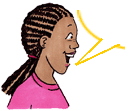 Who lives in The Gambia, Jack? Who lives in The Gambia, Jack? |
|
|  There are many different people living in the country. The largest group are the Mandinkas, followed by the Fula, Wollof, Jola and Sarahuli. Each group has its own language and customs. They have lived in this part of Africa for hundreds of years. There are many different people living in the country. The largest group are the Mandinkas, followed by the Fula, Wollof, Jola and Sarahuli. Each group has its own language and customs. They have lived in this part of Africa for hundreds of years. |
|
|
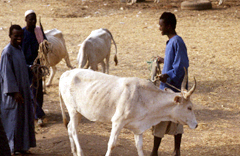
(Simon Scoones/Worldaware)
| The Fula remain a nomadic group, moving their animal herds from area to area in response to the changes in the seasons |
 How do they manage to speak to each other then? How do they manage to speak to each other then? |
|
|  Because The Gambia was once a British territory the main language is still English. But the spread of Islam in this area means most people are Muslims. Because The Gambia was once a British territory the main language is still English. But the spread of Islam in this area means most people are Muslims. |
|
|
| Most of the people are Muslims (90%) with the remainder Christian. Islam spread from other parts of Africa nearly a thousand years ago | 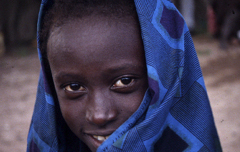
(Liba Taylor/Panos Pictures) |
 The influence of the British on The Gambia is more than just the language. Let's go back in time to find out more..... The influence of the British on The Gambia is more than just the language. Let's go back in time to find out more.....
|
|
 Do they wear clothes like ours? Do they wear clothes like ours? |
|
|
 The women wear jewellery and bright turbans with their dresses, whilst the men wear the long-sleeved ankle long shirts called fatara. The women wear jewellery and bright turbans with their dresses, whilst the men wear the long-sleeved ankle long shirts called fatara. |
|
|
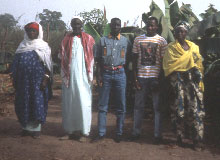
(Simon Scoones/Worldaware) | In the Gambia, it is the older people who wear more of the traditional clothes
|
 One and a half million people is quite a small population, isn't it? One and a half million people is quite a small population, isn't it? |
|
|  The population is growing fast. Nearly half the population is 15 years old or less. Also more people are choosing to move to the towns nearer the coast in the hope of finding work, so land is quite crowded. Can you think of what effect this has on the Health and Education services? The population is growing fast. Nearly half the population is 15 years old or less. Also more people are choosing to move to the towns nearer the coast in the hope of finding work, so land is quite crowded. Can you think of what effect this has on the Health and Education services? |
|
|
 Do the children go to schools like ours? Do the children go to schools like ours? |
|
|  Like here in the UK, primary school education is free for all Gambian children. But parents have to buy school uniforms, pens, paper, books and even something for their child to sit on. Can you imagine bringing your chair to school with you each day? Like here in the UK, primary school education is free for all Gambian children. But parents have to buy school uniforms, pens, paper, books and even something for their child to sit on. Can you imagine bringing your chair to school with you each day? |
|
|
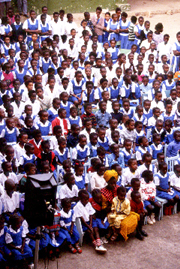
(Betty Press/Panos Pictures) | Assembly in the morning is an important time for the school to meet together, just like in the UK |
 Does this stop many children from going to school then? Does this stop many children from going to school then? |
|
|
 Cost is one reason, but in such a poor country, families also think it is more important to have their children working and earning money. Cost is one reason, but in such a poor country, families also think it is more important to have their children working and earning money. |
|
|
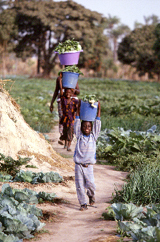
(Betty Press/Panos Pictures) | For many Gambian families, more children means more helping hands on the land |
 What sort of jobs do you do to help out the rest of the family? What sort of jobs do you do to help out the rest of the family? |
|
|
|

